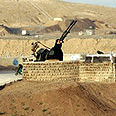
Iran continues to expand its nuclear program and efforts to prevent it are paralysed, with the UN Security Council undecided on new sanctions and attempts to kickstart negotiations with Tehran stalled, diplomats said Sunday.
Because of the standstill, the United States and its allies are looking to a meeting of the International Atomic Energy Agency's 35 nation board, which starts Monday, to increase the pressure on Tehran, they told The Associated Press.
Just two weeks ago, the IAEA reported that Iran had assembled more than 1,600 centrifuges in series at its underground facility at Natanz, and that most of them were being used to churn out small amounts of fuel-grade uranium. On Sunday, one of the diplomats said that number had now risen to more than 2,000 centrifuges and was expanding by about 300 centrifuges a week.
Iran's ultimate stated goal is running 54,000 centrifuges to churn out enriched uranium - enough for dozens of nuclear arms a year. But even an assembly of 3,000 of the machines can produce enough material for one such weapon within a year.
Iran insists it wants the technology only to meet future power needs and argues it is entitled to enrich uranium under the Nuclear Nonproliferation Treaty.
But suspicions bred by nearly two decades of clandestine nuclear activities, including black-market acquisitions of equipment and blueprints that appear linked to weapons plans, have led to two sets of UN sanctions over its refusal to freeze enrichment.
The IAEA report, sent to the Security Council May 23, formally gave the green light for new UN sanctions through its finding that Tehran continued to expand enrichment instead of complying with Council demands that it be fully curtailed.
Still, the diplomats said that - with lack of unity on what kind of new sanctions should be imposed and how quickly - the United States was looking for new evidence of Iranian nuclear defiance to shore up support for such punishments later this year.
That could be provided by Iran's decision earlier this year to abrogate part of an agreement linked to the Nuclear Nonproliferation Treaty under which Tehran is obligated to report to the agency as soon as it decides to build new nuclear facility or expand an existing one. Tehran subsequently cited this move in denying IAEA inspectors a visit to its Arak heavy water reactor that will produce plutonium - like enriched uranium a possible pathway to nuclear arms - once completed sometime in the next decade.
One of the diplomats said that the Americans failed to get support for an IAEA board resolution at the meeting starting Monday stating that Iran refusal to allow inspections of Arak was in noncompliance of its NPT obligations. But, he said they would continue to press their case during the meeting in hopes of increasing Security Council sentiment for new sanctions later this year.















